#but its Mostly liberals saying how much they hate leftists
Explore tagged Tumblr posts
Text
.
#tiktok has been giving me these racist/bad faith videos lately#its not the first time its done this stupid shit nor will it be the last#and the videos span from all spectrums of political alignment#but its Mostly liberals saying how much they hate leftists#to the point they will make up shit with a picture of a video that is actually really hard to jump to conclusions on#(but they do it anyways)#like. a guy saying a white girl was saying that 1 america has no hand in what happens with the countries we have a list of affecting#and 2 that she said that asians are a 'peace loving people incapable of harm'???????#which. watching the video. no such words were uttered#and he started the video off with 'look at this example of far left racism!!!!'#and even the screenshots he took. were of her talking about american racism and imperialism.#and the comments seem to be agreeing with him while Also being straight up racist#one guy is saying his a hardcore blue liberal who wants to 'kill them commies'#idk man#every week tiktok will decide i am the person for this shit#no matter if i block the tags or the users or even report them if its bad enough#idk why it would think the misinformation post explicitly about how this guy made up something and the comments being racist was my thing
0 notes
Note
the best thing about my coworkers being like... entirely leftist (well, mostly) is that when our cinema screens Harry Potter (which is... not uncommon, it's been 2 or 3 times in the past 5 years) my coworkers and I make it incredibly obvious that we're judging the guests. We all unanimously absolutely hate it and hate anyone that pays to come and see it. Like, we drop our guest service shtick, start being blunt, talk about how bad HP is when they're still within earshot. It's one of my favourite things to do ever and the best part is our managers do this too
I WISH PEOPLE IN MY LIFE WERE LIKE THIS. i dont know any actual harry potter fans but people will mention it and ill be like "ughhh i hate harry potter soo much" and theyll be like "oh yeah jk rowling sucks but i kind of dont think about her 😸" like... harry potter also sucks. It actually shocked me when i went back into the real world because my mom hates her so much shes told me she wants to burn the books we have from my childhood bc its inhumane to donate them. and my mother is an extreme liberal who would in ANY other case say bookburning is wrong. like jk rowling is a large presence in my life idk how you can ignore it!!
3 notes
·
View notes
Text
Not just Tiktok ALL of the US based mainstream Streaming / video platforms have been tightening their rules and cracking down dissident opinion and suppressing leftist and minority voices for years. BUT what about the alternative platforms claiming to be for more "Free Speech"? Are they all just for reactionaries?
TL;DR kinda, but these may be the least bad with biggest audiences, and if you are brave or desperate for visibility for your work or cause they may be worth checking out
Streaming: Kick is basically Twitch for people who got kicked out of streaming on twitch - cool, since twich notoriously bans minorities and women over massreporting trolls and for wearing tube tops, let us investigste this site! But of course they mean freedom to be an asshole, and majorly the site has seen user who got banned FOR inciting hate, not the target of it, the few women and a nonbinary person streaming there I talked to said it is indeed even more vitriolic than twitch for minorities and really not a place for anyone unless you indeed get banned elsewhere and need any visibility (for online work or cause) . The problems of this site also run deeper than the userbase: One of the owners of the paltform allegedly was caught watching and laughing in stream chat of some dude trying to trick a trans sexworker into perforning on hidden cam. Felony in many states on top of obviously morally despicable. Being lewd on your own stream is a bannable offence on kick and kick will kick you for no reason other than admin not liking you - but people have allegedly shared revengep0rn etc and gotten away with it. I thought best not to investigste further, nor to make an account so I can not say if radical leftists would be allowed to stay - but I for sure would not want to share my personal information with this site, no matter how much better the revenue share is. But, if you are feeling bold and you funnel financial support through patreon etc and not the site itself I can not stop you.
Videos/streaming: Rumble is youtube for people who got banned from youtube a free speech youtube they say expect guess what you will never believe this from a "we respect your free apeech" website guess what they of course under the law have to ban hateful ideogies from the site but YOU WILL NEVER BELIEVE THIS (you knew it) they lumped antifa together with KKK as hateful symbols/ideologies ahahhahaha oh well. The rules are pretty much just as strict as any other site what comes to self expression but there are some radical leftists on the site who get okay views - whether hateviews or not if your goal is to plant the seed of labor movement to the heads of diagruntled working class men, hateview is something you don't mind. If you want your cause heard, and fear facing youtube ban (which they weed out leftists thought too if you ever wonder why many people who started radical on YT make fluff content now... ) it would not hurt to be on this site but again, make sure your privacy is priority and it never hurts to have peer support behind the scenes no matter which site you make content for but especially if you put yourself out on platforms mostly hostile to your thought or person.
Short form video app: Clapper, tiktok for adults
Or some call it conservative tiktok which is funny to me considering their rules and lax attitude are far more liberal than anywhere else. My feed has been mostly thirsttraps, bad boomer jokes, pranks and tiktok reposts. The algo has been like that since the beginning so not sure if its trainable like tiktoks. It seems people on the app have just learnt how to scroll away from stuff they don't like and leave it at that - unlike on tiktok where everyones got impulse control problems and inability to curate their experience. The attitude in my experience being on it for a year is live and let live. I have yet to try their live features though, but I have heard good things from other creators who use it to promote their shops and sites.
Then again, I have not made particularly radical content over there, but along with occasional trumpster a few anarchists and labor unionists have crossed my feed. They even have an official anarchist profile tag which obviously seems suspicious to actually use on an US based app but I was surprised to see it listed at all (no communist profile tag but even if there was do not self flag yourself like that lol) The maturity of the userbase could prove useful for anyone looking for a venue to talk about labor rights for example. My experience there is more as a creator/promoter and for nsfwCreators looking for visibility it is quite welcoming, lewd jokes and non-explicit lingerie/bikinis are fine to post and unlike tiktok, people are generally polite and positive in their comments (unless you are doing something outrageous - the clapper pranks are very odd, niche genX humor? Just learn to scroll away) . They even allow spicy links in your bio which pretty much tells the whole community to fuck off if they hate 0uef girls.
None of these sites I would spend time watching, but for posting and reaching people, I have had good results with Clapper, Rumble I have considered trying as it can not be worse than youtube and kick... well... kick can eat shit. You can stream on the other two if streaming is ehat you want to do.
#alternative social media#leftist content creators#online censorship#leftist#streaming#streaming platforms
0 notes
Text

oh youve done it now @kafkaesquegf this is me elaborating. well first of all I've rethought my statement and I don't think he would've Hated it. my full thoughts are below the cut it is very garbled, not at all organised and hardly proofread. but if I have time I might write a full brechtian analysis of the game. anyway
So i have no doubt that thematically and politically brecht would agree with and fuck with disco elysium. But i think that the method that the devs of disco elysium took to convey their ideas is like the polar opposite of what brecht would have done.
disco elysium is hyper-immersive, its a second person narrative, first person player game where you are the "you" of the story and you make harry's decisions for him. You choose how much information to take in, how much information to give, you have the controls. But you are still at the mercy of the dice and the reactions of the other characters. you are subject to the narrative, even as a member of the "audience" or an outsider to the world of elysium.
but brecht's idea of verframdungseffekt is all about not allowing the audience to become immersed in the world or the emotions of his stories. he didn't believe theatre should be pure passive enjoyment, but for the audience's enjoyment to be taken from "putting [their] reason to work". the audience should always be reminded that what they are observing is a piece of fiction and merely a reflection of reality and they should be observing it in terms of what it says about society and social roles blah blah. and his idea of epic theatre is anti-tragedy, anti-"you are trapped in the narrative and there is no escaping", so I think he would have opposed the probability based game mechanics of DE on the basis that the "audience" cannot be part of the story if that takes away their autonomy or freedom, as a participant and as an observer. I mean, he isn't augusto boal (look up spectactor and theatre of the oppressed)
that being said, disco elysium is obviously the opposite of passive enjoyment, and every aspect of it encourages interpretation and rational thought - which brecht would have loves (he said he wanted the audience to be "psychologists" of his plays, which is how many people engage with DE as well) - but it still allows an element of "forget your reality and live in this fantasy world", even though the creators deliberately made every aspect of the world reflect our real world! I think Marxist and other leftist fans of the game love to dissect the sociopolitical realities of the game and what they reflect of our world, but other people will either fully see it as a fictional world that requires no critical thought and can just be enjoyed and experienced without any real-life relevance, or they will see the way it reflects reality and become impatient/rage quit, or simply ignore it. now this isn't a fault of the game, that's all a byproduct of people not being able to engage critically with art, or just because liberals don't like being made fun of :P but brecht's methods (ideally) don't leave any room for that. the fiction must be separated from the reality; the point of epic theatre, I believe, is to remind that us real people aren't tied to fate or a narrative structure that renders freedom meaningless, and we are in fact in control of our lives (workers of the world unite). so ultimately this is me projecting my autistic pedantry through the lens of brecht's theories and criticisms on theatre and art in general.
I may be contradicting myself here. maybe if I looked at it again I'd see that DE aligns with brecht's theories far more than i originally thought. but in conclusion he would have loved disco elysium as a work of literature but not as a piece of theatre, but he would encourage engaging with it as both those things (it is not merely a game it is a novel!) mostly i believe he wouldn't enjoy video games in general. because of his whole verframdungseffekt deal. so yeah
everyone go read Brecht On Theatre: The Development of an Aesthetic, edited and translated by John Willett
rip bertolt brecht you would have hated disco elysium
44 notes
·
View notes
Text
I have like, a LOT of empathy for Travis McElroy. I assume that the common stance on Travis in my circles on tumblr is mostly... neutrality-to-moderate-dislike, because the leftists I follow are generally not super into the McElroys (they're liberals, so that makes sense). These bloggers' general unawareness of Travis's whole deal causes the neutrality towards him, but the fact that he is clearly a liberal, has been documented as "annoying", and his among us rant became a a meme, all cause that dislike of Travis seen in some tumblr culture.
And it's like, yeah. That's all fine. Feel how you want about the guys. I think almost nobody I've seen talking about Travis on tumblr has said anything that I consider particularly awful to say about a person. But on reddit, it's a completely different story.
r/TAZcirclejerk is a subreddit that is, like, so completely Not That Deep. It's literally a subreddit designed for extremely low-quality commentary on the The Adventure Zone podcast by the McElroys. It's a silly little echo chamber containment zone to keep... well, circlejerking, off the main sub. That's the whole point.
But... it is also just a hate sub for Travis. They call him "Vart", which, no idea on when and how that started (other than it being "Trav" backwards), but it's not a nickname I've seen in other places, and it's used very... grossly. Most of the posts are people getting their hate-boner on for Travis. And like, I don't think that's what r/TAZcirclejerk should be for? It's essentially become r/Traviscirclejerk, but connected to the The Adventure Zone title and the main The Adventure Zone subreddit, giving it high visibility for people who are NOT explicitly searching out Travis critique. So, like, the experience of being Travis is that one of the most popular (current) discussion points of your fun family podcast is how much the (former) fandom fucking hates you.
Sometimes it just makes me feel sad and almost queasy when I imagine it. KNOWING you are the least favorite brother. KNOWING that it is common for people to come out of listening to your podcast loving your brothers and father and hating just you. Having all your least favorite parts of yourself picked out and examined ruthlessly. Deciding to DM a game for your family and post that game online for the people who you know enjoy listening to your family play DnD, and receiving a huge backlash of "wait, no, we didn't want YOU in charge". A huge backlash of breaking down all the mistakes you made. Just piles of vitriol online for you. And not your brothers. Like, that's the part that hurts me. Not your brothers. The other people who I find are excessively criticized online are mostly criticized as a lone entity, and its easier to say "oh they dont like what I make, that's all" or "they're just a hater" when you get criticized in that way. What do you say when the hate is "I LOVE what you make, I LOVE your family, I HATE... you. Not for what you make, not because of politics or that I don't vibe with your community, but because I don't like YOU."
If I was Travis McElroy it would absolutely break me.
3 notes
·
View notes
Text
Anonymous said: I didn’t know too much about the late British philosopher Sir Roger Scruton until I followed your superbly cultured blog. As an ivy league educated American reading your posts, I feel he is a breath of fresh air as a sane and cultured conservative intellectual. We don’t really have his kind over here where things are heavily polarized between left and right, and sadly, we are often uncivil in our discourse. Sir Roger Scruton talks a lot about beauty especially in art (as indeed you do too), so for Scruton why does beauty as an aesthetic matter in art? Why should we care?
I thank you for your very kind words about my blog which I fear is not worthy of such fulsome praise.
However one who is worthy of praise (or at least gratitude and appreciation at least) is the late Sir Roger Scruton. I have had the pleasure to have met him on a few informal occasions.
Most memorably, I once got invited to High Table dinner at Peterhouse, Cambridge, by a friend who was a junior Don there. This was just after I had finished my studies at Cambridge and rather than pursue my PhD I opted instead to join the British army as a combat pilot officer. And so I found out that Scruton was dining too. We had very pleasant drinks in the SCR before and after dinner. He was exceptionally generous and kind in his consideration of others; we all basked in the gentle warmth of his wit and wisdom.
I remember talking to him about Xanthippe, Socrate’s wife, because I had read his wickedly funny fictional satire. In the book he credits the much maligned Xanthippe with being the brains behind all of Socrates’ famous philosophical ideas (as espoused by Plato).
On other occasions I had seen Roger Scruton give the odd lecture in London or at some cultural forum.

Other than that, I’ve always admire both the man and many of his ideas from afar. I do take issue with some of his intellectual ideas which seem to be taken a tad too far (he think pre-Raphaelites were kitsch) but it’s impossible to dislike the man in person.
Indeed the Marxist philosopher G.A. Cohen reportedly once refused to teach a seminar with Scruton, although they later became very good friends. This is the gap between the personal and the public persona. In public he was reviled as hate figure by some of the more intolerant of the leftists who were trying to shut him down from speaking. But in private his academic peers, writers, and philosophers, regardless of their political beliefs, hugely respected him and took his ideas seriously - because only in private will they ever admit that much of what Scruton talks about has come to pass.
In many ways he was like C.S. Lewis - a pariah to the Oxbridge establishment. At Oxford many dons poo-pooed his children stories, and especially his Christian ideas of faith, culture, and morality, and felt he should have laid off the lay theology and stuck to his academic speciality of English Literature. But an Oxford friend, now a don, tells me that many dons read his theological works in private because much of what he wrote has become hugely relevant today.
Scruton was a man of parts, some of which seemed irreconcilable: barrister, aesthetician, distinguished professor of aesthetics. Outside of brief pit stops at Cambridge, Oxford, and St Andrews, he was mostly based out of Birkbeck College, London University, which had a tradition of a working-class intake and to whom Scruton was something of a popular figure. He was also an editor of the ultra-Conservative Salisbury Review, organist, and an enthusiastic fox hunter. In addition he wrote over 50 books on philosophy, art, music, politics, literature, culture, sexuality, and religion, as well as finding time to write novels and two operas. He was widely recognised for his services to philosophy, teaching and public education, receiving a knighthood in 2016.
He was exactly the type of polymath England didn’t know what to do with because we British do discourage such continental affectations and we prefer people to know their lane and stick to it. Above all we’re suspicious of polymaths because no one likes a show off. Scruton could be accused of a few things but he never perceived as a show off. He was a gentle, reserved, and shy man of kindly manners.

He was never politically ‘Conservative’, or tried not to be. Indeed he encouraged many to think about defining “a philosophy of conservatism” and not “a philosophy for the Conservative Party.” In defining his own thoughts, he positioned conservatism to relation to its historical rivals, liberalism and socialism. He wrote that liberalism was the product of the enlightenment, which viewed society as a contract and the state as a system for guaranteeing individual rights. While he saw socialism as the product of the industrial revolution, and an ideology which views society as an economic system and the state as a means of distributing social wealth.
Like another great English thinkers, Michael Oakeshott, he felt that conservatives leaned more towards liberalism then socialism, but argued that for conservatives, freedom should also entail responsibility, which in turn depends on public spirit and virtue. Many classical liberals would agree.
In fact, he criticised Thatcherism for “its inadequate emphasis on the civic virtues, such as self-sacrifice, duty, solidarity and service of others.” Scruton agreed with classical liberals in believing that markets are not necessarily expressions of selfishness and greed, but heavily scolded his fellow Conservatives for allowing themselves to be caricatured as leaving social problems to the market. Classical liberals could be criticised for the same neglect.
Perhaps his conservative philosophy was best summed up when he wrote “Liberals seek freedom, socialists equality, and conservatives responsibility. And, without responsibility, neither freedom nor equality have any lasting value.”
Scruton’s politics were undoubtedly linked to his philosophy, which was broadly Hegelian. He took the view that all of the most important aspects of life – truth (the perception of the world as it is), beauty (the creation and appreciation of things valued for their own sake), and self-realisation (the establishment by a person of a coherent, autonomous identity) – can be achieved only as part of a cultural community within which meaning, standards and values are validated. But he had a wide and deep understanding of the history of western philosophy as a whole, and some of his best philosophical work consisted of explaining much more clearly than is often the case how different schools of western philosophy relate to one another.
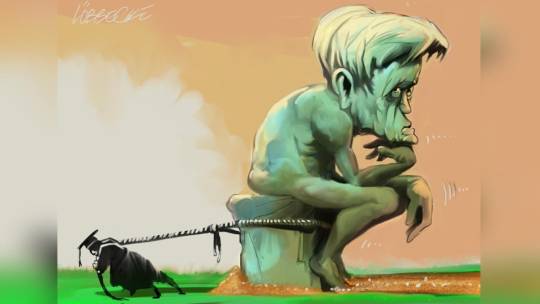
People today still forget how he was a beacon for many East European intellectuals living under Communist rule in the 1980s. Scruton was deeply attached in belonging to a network of renowned Western scholars who were helping the political opposition in Eastern Europe. Their activity began in Czechoslovakia with the Jan Hus Foundation in 1980, supported by a broad spectrum of scholars from Jacques Derrida and Juergen Habermas to Roger Scruton and David Regan. Then came Poland, Hungary and later Romania. In Poland, Scruton co-founded the Jagiellonian Trust, a small but significant organisation. The other founders and active participants were Baroness Caroline Cox, Jessica Douglas-Home, Kathy Wilkes, Agnieszka Kołakowska, Dennis O’Keeffe, Timothy Garton Ash, and others.
Scruton had a particular sympathy for Prague and the Czech society, which bore fruit in the novel, Notes from Underground, which he wrote many years later. But his involvement in East European affairs was more than an emotional attachment. He believed that Eastern Europe - despite the communist terror and aggressive social engineering - managed to preserve a sense of historical continuity and strong ties to European and national traditions, more unconscious than openly articulated, which made it even more valuable. For this reason, decades later, he warned his East European friends against joining the European Union, arguing that whatever was left of those ties will be demolished by the political and ideological bulldozer of European bureaucracy.

Anyway, digressions aside, onto to the heart of your question.
Art matters.
Let’s start from there. Regardless of your personal tastes or aesthetics as you stand before a painting, slip inside a photograph, run your hand along the length of a sculpture, or move your body to the arrangements spiraling out of the concert speakers…something very primary - and primal - is happening. And much of it sub-conscious. There’s an element of trust.
Political philosopher, Hannah Arendt, defined artworks as “thought things,” ideas given material form to inspire reflection and rumination. Dialogue. Sometimes even discomfort. Art has the ability to move us, both positively and negatively. So we know that art matters. But the question posed by modern philosophers such as Roger Scruton has been: how do we want it to affect us?
Are we happy with the direction art is taking? Namely, says, Scruton, away from seeking “higher virtues” such as beauty and craftmanship, and instead, towards novelty for novelty’s sake, provoking emotional response under the guise of socio-political discourse.
Why does beauty in art matter?
Scruton asks us to wake up and start demanding something more from art other than disposable entertainment. “Through the pursuit of beauty,” suggests Scruton, “we shape the world as our own and come to understand our nature as spiritual beings. But art has turned its back on beauty and now we are surrounded by ugliness.” The great artists of the past, says Scruton, “were painfully aware that human life was full of care and suffering, but their remedy was beauty. The beautiful work of art brings consolation in sorrow and affirmation…It shows human life to be worthwhile.” But many modern artists, argues the philosopher, have become weary of this “sacred task” and replaced it with the “randomness” of art produced merely to gain notoriety and the result has been anywhere between kitsch to ugliness that ultimately leads to inward alienation and nihilistic despair.
The best way to understand Scruton’s idea of beauty in art and why it matters is to let him speak for himself. Click below on the video and watch a BBC documentary broadcast way back in 2009 that he did precisely on this subject, why beauty matters. It will not be a wasted hour but perhaps enrich and even enlighten your perspective on the importance of beauty in art.
vimeo
So I’ll do my best to summarise the point Scruton is making in this documentary above.
Here goes.....
In his 2009 documentary “Why Beauty Matters”, Scruton argues that beauty is a universal human need that elevates us and gives meaning to life. He sees beauty as a value, as important as truth or goodness, that can offer “consolation in sorrow and affirmation in joy”, therefore showing human life to be worthwhile.
According to Scruton, beauty is being lost in our modern world, particularly in the fields of art and architecture.
I was raised in many different cultures from India, Pakistan, to China, Japan, Southern Africa, and the Middle East as well schooling in rural Britain and Switzerland. So coming home to London on frequent visits was often a confusing experience because of the mismatch of modern art and new architecture. In life and in art I have chosen to see the beauty in things, locating myself in Paris, where I am surrounded by beauty, and understand the impact it can have on the everyday.
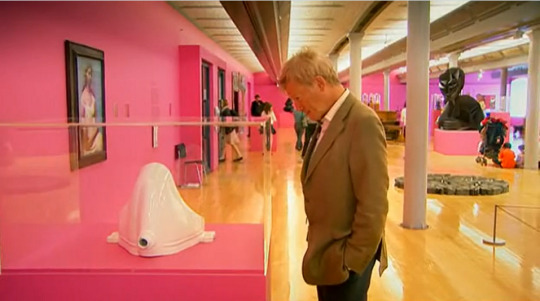
Scruton’s disdain for modern art begins with Marcel Duchamp’s urinal. Originally a satirical piece designed to mock the world of art and the snobberies that go with it, it has come to mean that anything can be art and anyone can be an artist. A “cult of ugliness” was created where originality is placed above beauty and the idea became more important than the artwork itself. He argues that art became a joke, endorsed by critics, doing away with a need for skill, taste or creativity.
Duchamp’s argument was that the value of any object lies solely in what each individual assigns it, and thus, anything can be declared “art,” and anyone an artist.
But is there something wrong with the idea that everything is art and everyone an artist? If we celebrate the democratic ideals of all citizens being equal and therefore their input having equal value, doesn’t Duchamp’s assertion make sense?
Who’s to say, after all, what constitutes beauty?
This resonated with me in particular and brought to mind when Scruton meets the artist Michael Craig-Martin and asks him about how Duchamp’s urinal first made him feel. Martin is best known for his work “An Oak Tree” which is a glass of water on a shelf, with text beside it explaining why it is an oak tree. Martin argues that Duchamp captures the imagination and that art is an art because we think of it as such.
When I first saw “An Oak Tree” I was confused and felt perhaps I didn’t have the intellect to understand it. When I would later question it with friends who worked in the art auction and gallery world, the response was always “You just don’t get it,” which became a common defence. To me, it was reminiscent of Hans Christian Andersen’s short tale “The Emperor’s New Clothes”, about two weavers who promise an emperor a new suit of clothes that they say is invisible to those who are unfit for their positions, stupid or incompetent. In reality, they make no clothes at all.
Scruton argues that the consumerist culture has been the catalyst for this change in modern art. We are always being sold something, through advertisements that feed our appetite for stuff, adverts try to be brash and outrageous to catch our attention. Art mimics advertising as artists attempt to create brands, the product that they sell is themselves. The more shocking and outrageous the artwork, the more attention it receives. Scruton is particularly disturbed by Piero Manzoni’s artwork “Artist’s Shit” which consists of 90 tin cans filled with the artist’s excrement.
Moreover the true aesthetic value, the beauty, has vanished in modern works that are selling for millions of dollars. In such works, by artists like Rothko, Franz Kline, Damien Hirst, and Tracey Emin, the beauty has been replaced by discourse. The lofty ideals of beauty are replaced by a social essay, however well intentioned.
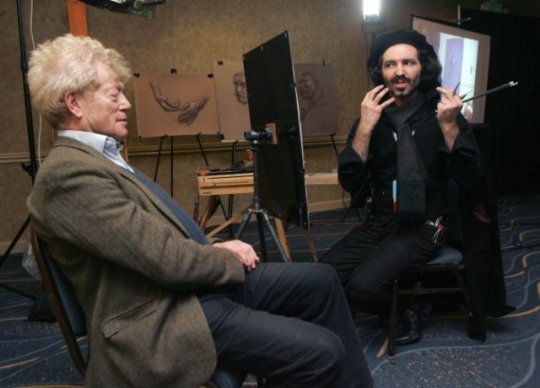
A common argument for modern art is that it is reflecting modern life in all of its disorder and ugliness. Scruton suggests that great art has always shown the real in the light of the ideal and that in doing so it is transfigured.
A great painting does not necessarily have a beautiful subject matter, but it is made beautiful through the artist’s interpretation of it. Rembrandt shows this with his portraits of crinkly old women and men or the compassion and kindness of which Velazquez paints the dwarfs in the Spanish court. Modern art often takes the literal subject matter and misses the creative act. Scruton expresses this point using the comparison of Tracey Emin’s artwork ‘My Bed’ and a painting by Delacroix of the artist’s bed.
The subject matters are the same. The unmade beds in all of their sordid disdain. Delacroix brings beauty to a thing that lacks it through the considered artistry of his interpretation and by doing so, places a blessing on his own emotional chaos. Emin shares the ugliness that the bed shows by using the literal bed. According to Emin, it is art because she says that it is so.
Philosophers argued that through the pursuit of beauty, we shape the world as our home. Traditional architecture places beauty before utility, with ornate decorative details and proportions that satisfy our need for harmony. It reminds us that we have more than just practical needs but moral and spiritual needs too. Oscar Wilde said “All art is absolutely useless,” intended as praise by placing art above utility and on a level with love, friendship, and worship. These are not necessarily useful but are needed.
We have all experienced the feeling when we see something beautiful. To be transported by beauty, from the ordinary world to, as Scruton calls it, “the illuminated sphere of contemplation.” It is as if we feel the presence of a higher world. Since the beginning of western civilisation, poets and philosophers have seen the experience of beauty as a calling to the divine.
According to Scruton, Plato described beauty as a cosmic force flowing through us in the form of sexual desire. He separated the divine from sexuality through the distinction between love and lust. To lust is to take for oneself, whereas to love is to give. Platonic love removes lust and invites us to engage with it spiritually and not physically. As Plato says, “Beauty is a visitor from another world. We can do nothing with it save contemplate its pure radiance.”
Scruton makes the prescient point that art and beauty were traditionally aligned in religious works of art. Science impacted religion and created a spiritual vacuum. People began to look to nature for beauty, and there was a shift from religious works of art to paintings of landscapes and human life.

In today’s world of art and architecture, beauty is looked upon as a thing of the past with disdain. Scruton believes his vision of beauty gives meaning to the world and saves us from meaningless routines to take us to a place of higher contemplation. In this I think Scruton encourages us not to take revenge on reality by expressing its ugliness, but to return to where the real and the ideal may still exist in harmony “consoling our sorrows and amplifying our joys.”
Scruton believes when you train any of your senses you are privy to a heightened world. The artist sees beauty everywhere and they are able to draw that beauty out to show to others. One finds the most beauty in nature, and nature the best catalyst for creativity. The Tonalist painter George Inness advised artists to paint their emotional response to their subject, so that the viewer may hope to feel it too.
It must be said that Scruton’s views regarding art and beauty are not popular with the modern art crowd and their postmodern advocates. Having written several books on aesthetics, Scruton has developed a largely metaphysical aspect to understanding standards of art and beauty.
Throughout this documentary (and indeed his many books and articles), Scruton display a bias towards ‘high’ art, evidenced by a majority of his examples as well as his dismissal of much modern art. However on everyday beauty, there is much space for Scruton to challenge his own categories and extend his discussion to include examples from popular culture, such as in music, graphic design, and film. Omitting ‘low art’ in the discussion of beauty could lead one to conclude that beauty is not there.

It is here I would part ways with Scruton. I think there is beauty to be found in so called low art of car design, popular music or cinema for example - here I’m thinking of a Ferrari 250 GTO, jazz, or the films of Bergman, Bresson, or Kurosawa (among others) come to mind. Scruton gives short thrift to such 20th century art forms which should not be discounted when we talk of beauty. It’s hard to argue with Jean-Luc Godard for instance when he once said of French film pioneering director, Robert Bresson, “He is the French cinema, as Dostoevsky is the Russian novel and Mozart is German music.”
Overall though I believe Scruton does enough to leave us to ponder ourselves on the importance of beauty in the arts and our lives, including fine arts, music, and architecture. I think he succeeds in illuminating the poverty, dehumanisation and fraud of modernist and post-modernist cynicism, reductionism and nihilism. Scruton is rightly prescient in pointing the centrality of human aspiration and the longing for truth in both life and art.
In this he is correct in showing that goodness and beauty are universal and fundamentally important; and that the value of anything is not utilitarian and without meaning (e.g., Oscar Wilde’s claim that “All art is absolutely useless.”). Human beings are not purposeless material objects for mechanistic manipulation by others, and civil society itself depends upon a cultural consensus that beauty is real and every person should be respected with compassion as having dignity and nobility with very real spiritual needs to encounter and be transformed and uplifted by beauty.
Thanks for your question.
#ask#question#sir roger scruton#scruton#art#aesthetics#beauty#architecture#music#paintings#film#cinema#personal
48 notes
·
View notes
Text
Something that probably belongs here right now: why on earth aren’t conservatives protesting the feds’ obvious overreach re: the anti-racism protestors nearly as much as they’re protesting the (much, much more reasonable) restrictions around COVID.*
Before I start: I need you to imagine, for a second, how you’d feel if a group of neo-Nazis moved into your local metro area. If they slapped horrible racist propaganda wall-to-wall, made the national news multiple times, looted and broke windows.... How you’d feel if they actively took over a chunk of the city, calling it an “autonomous zone”, and beating up anyone who tried to stop them.
how would you feel if law enforcement stood aside and let them do this crap? how would you feel if the ACLU came in to defend their legal right to do this? how would you feel if major conservative politicians came out in support of them, even justifying their looting, and it looked like lawmakers would cave to their demands?
I am not saying that the protestors are remotely morally equivalent to neo-Nazis. But I want you to take that fear, and hold onto it as you keep reading.
A lot of conservatives believe that anyone left of centre hates America as much as “terrorists” do. They believe ~leftists~ want to brainwash their children into hating America too, and are just minutes away from murdering anyone who disagrees with them.
...and, if I’m being honest, these beliefs are not entirely without merit. Leftists and liberals say “fuck America” all the time, and the number of times I’ve heard left-wing people say ‘nuke the South’ is unreal. if you take people who say that kind of crap at their word, they want anyone right of centre dead. and even if you don’t, even if you assume it’s all hyperbole-- like, yeah, most of us want conservatives to ~give up their way of life~, because a lot of it assumes that everyone is just like them, and not everyone is.
they see us as morally equivalent to neo-Nazis or Terrorists (TM). becuase they think, rightly or wrongly, that we want to terrorize them. we want to keep them from doing what they’ve always done, and teach their children to hate them. we want to murder them.
and the only thing stopping us from doing so, a lot of these people think, is law enforcement. most conservatives know people who work in law enforcement and/or the military. they know that those people are Like Them and want them to be safe. they know that cops want to keep them safe from terrorists and are only stopped by the namby-pamby milquetoast civilian government.
(yes, I just threw up in my mouth a little writing that.)
The government is supposed to keep Real Americans (TM) safe from Terrorists (TM). the fact that they didn’t under the Obama administration- that the Obama administration was full of people who’d actively talked about how they don’t like or trust America Because Racism, that they mostly just let protestors do their thing when they happened, that they actively supported ~leftists in academia~- that was all proof that the government was Out To Get Us.
Trump positioned himself as One Of Them. As someone who’d Drain The Swamp (TM). as someone who’d stop all the bureaucrats who were getting in the way of cops ~keeping them safe from terrorists~. who’d be a big powerful leader with a big stick, etc.
in the heads of the people protesting COVID but Completely Fine with jackbooted thugs dragging away unarmed protestors, when it comes to the protestors, the government is actually doing their job for once. the government is using its force against ~terrorists~ instead of against ~real Americans~.
and the fact that the government could easily turn that force against them? not even on their radar. they think their dear leader has their best interests at heart, so of course they’ll be okay.
Nota bene: i am not going to actively research what Fox/boomer facebook/Alex Jones/etc. are currently saying about this because i think if I do I will lose my goddamn mind. This is purely based on what I learnt growing up about the ~!!Conservative Mindset!!~. Some parts of this may be inaccurate or otherwise outdated, because I left the GOP in 2012.
178 notes
·
View notes
Note
sarah, how can i even begin to talk my white middle class father out of my country's rising anti-immigrant and nationalist sentiment? i get very emotional arguing and it's not helping me get through to him at all. he's a rational, educated person but always convinced he's in the right and i have no idea how to approach this effectively
If you get a definitive, helpful answer to this question, please let me know. Particularly as someone who’s got her own white middle-class father, one thinks that men are genetically, innately Men (which is not a definition we created, but something ontologically real about that arrangement of DNA) and homophobia is something invented in the last decade or so (and so not something you can accuse the Catholic Church of practicing in the third century AD) and quote-unquote-activist judges are only ever liberals (never mind the Lochner court, or even the Rehnquist era).
…………..I have definitely cried after a frustrating conversation with my white middle class father about the Supreme Court’s decision in Masterpiece Cakeshop, so like. I get it.
However, I have found there are a number of strategies that you can use with your Ideologically Opposed Loved One (IOLO) to start opening up these conversations to a genuine exchange of ideas rather than shouting at them across an impassible ravine full of recrimination.
1.) Let them talk. My mother is a dedicated hype-woman for Brené Brown, and is always recommending her TED talks to me. Now, while I disagree with Brown on some points, I agree that what she calls “rumble language” is a useful way of thinking about conversations with your IOLO. Rather than go for the throat, fight back, or point out how absolutely totally wrong!!! your IOLO is, ask them to explain themselves. Say, “I don’t understand.” Ask them to explain what they mean, when they say that immigrants are draining our social services. Have them tell you more about capitalism being The Best.
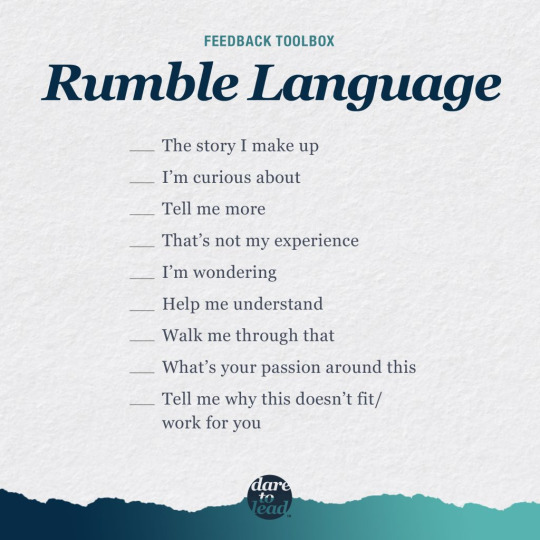
Let them talk. Let them talk at length, follow up with questions that clarify where they are and the space between you, because the next step is…
2.) Actually listen. My brain also goes “PING!!!” every time my white middle class father hits on a conservative talking point. It takes heroic effort not to snap “you know that’s what [Fox News talking head] said too,” or “deregulation has been a conservative hobby horse since Reagan,” or “just because you’re not willing to learn about history or interrogate your homophobia doesn’t mean I’m wrong.” But I can tell you: I have actually said those things out loud, and nothing shuts down a conversation like replying to an argument you’re not actually having.
It’s tempting to boil down your IOLO to the same back-and-forth you read about online. A reasonably informed liberal has a specter of an anti-immigrant nationalist in her head, along with that ghost’s best, most brilliantly burnished arguments. But unless your plan is to go back and forth with your IOLO and never agree on a starting point or make any progress at all….well, you’re going to have to listen to them specifically.
It’ll involve a lot of backing off, and letting them talk—asking rumble questions and then listening to the answer. Paraphrase what they said; if they push back by saying that’s not what they meant, then ask what they meant. Try to find those places where what’s preached on cable or through social media is different, is distinct, from what your IOLO believes.
Where they are, where they feel most strongly and in response to what they actually articulate, that’s where you want to apply pressure. Notice I’m not saying “shout at them until they get it.” Applying pressure is gradual, it’s a squeeze not a slap. It involves saying, calmly, “I don’t know if I agree with that,” or “What do you think about all that data that says immigrants contribute more to the economy than the social services they utilize?” It’s so easy to get angry and emotional---this stuff means a lot, this is important stuff---but shouting or crying or accusing is a slap. It unfortunately tends to shut down the conversation.
And that’s not productive, because the next step is:
3.) Apply pressure without anticipation of follow-through. I have been have the same 3 arguments with my father for the last 4-8 years. I can tell you that the beautiful fantasy where your IOLO comes to you and says, “You were right, I was a fool, you made such good points on October 12, 2019, that now I am saved and want to be an ally,” is a nonsense delusion.
What you’re hoping for is a gradual erosion, like the sea beating against rocks. Eventually you’ll get sand, but mostly your job is to gradually push against an immovable object until it gives. Bit by bit. Grain of sand by grain of sand. Don’t expect to win every round, just state your case calmly and clearly, ask the right questions, and let your IOLO walk away with something new potentially fermenting in their brain.
It might take years. I’ve been talking to my mother about leftist issues for the last…half a decade; but it was only in the last six months that she (to my enormous surprise) went on a 5 minute rant about the fallacy of white suburbia. She actually uttered the phrase “redlining.” Sometimes, you just have to plant a seed, give someone a different argument, ask a question they didn’t realize was askable.
Destabilizing someone’s knowledge of the world is a process, not an event. And sometimes, amid all that tumult, it’s worthwhile to:
4.) Occasionally, let them be the expert (….just not in this). I had a few weeks’ vacation between my last job and current job, which I spent in my parents’ house. My father tends to come home for lunch—and since I was also there, we’d often have a casual conversation, talk about news or Netflix shows, his job and its frustrations. It was very normal, except for the one time I just….listened to him talk about the stock market.
Now, my dad is a dedicated investor and pays attention to all the details of the NASDAQ and the financial markets as a whole; he spends his free time reading books about investment and financial analysis. If he’d lived a different life, he might be manager of a mutual fund. This is his area, and when we started talking about whether the US might be headed for a recession—
I shut up. I honestly don’t know much about investing, but I wrestled every instinct I had to interrupt him or contradict him to the ground. I nodded. I active listened, echoing his points back to him. I did not interrupt, even when he started talking about the debt ceiling (something he and I disagree about).
And he noticed. I know he noticed, because when he and my mother came home after work, he mentioned our conversation to her. He was pleased and proud, both having had the opportunity to be the expert and teaching me something I ostensibly didn’t know. And the next time we argued, he was gentler, willing to consider my perspective since I had considered his.
When it comes to adult family, I think it’s easy to think of them as untouchable, unimpeachable and unchangeable, beyond any base emotional lures. Someone espousing an ideology you viciously hate and nothing more. But your IOLO is just as human as you are, and we all seek affirmation and confirmation. You want to win points to expend upon a future date? Let them have their victory. And later, claim yours.
410 notes
·
View notes
Note
Why do fascists hate capitalism?
Good question. About half the reasons they hate capitalism are the same reason most leftist do, bad people are still likely to be annoyed at a bad thing that hurts them. Here are the other reasons
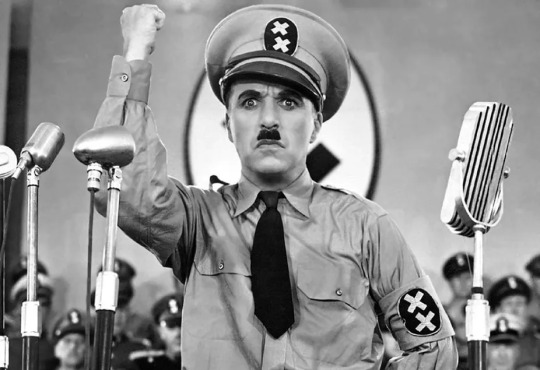
1) Fascists don’t believe in social mobility. Capitalism core tenant is “social mobility’, that somebody can work hard and become a billionaire, blah blah blah. Now this focus on social mobility is and always has been mostly a lie, but even rhetorically capitalism values the notion of social advancement. fascists do not, in fascist ideology, your birth determines your place in the world, and is part of a “natural order”. The only way to improve yourself is through war, and even that is more fulfilling your existing destiny rather than creating your own. Thus Fascists despises any form of social advancement outside military leadership, which is a major reason why they hate liberalism, socialism and communism, but its also a reason why they hate capitalism (though they usually prioritize the left wing ideologies first). This is even more true for them when somebody they think is “inferior” advances ‘above their station. Fascists aren’t aristocratic, but they hate capitalism for much of the same reason that the feudal aristocrats and monarchs hated it. It brings change and challenges the caste system

(Speaking of which)
2) On that note, capitalism is rarely…ideologically racist. Now capitalism is racist, it promotes and enforces existing racial hierarchies, and much of the damage of colonialism can be laid at the feet of capitalism. However capitalist ideology rarely buys directly into blood purity or “The Volk” style race theory that fascists so love. Capitalism in the US makes it super difficult for a black man to advance compared to his white counterpart, but if a black man does manage to become a billionaire, capitalism is basically cool with it. If you look at a demographic breakdown of the 1%, it is mostly old white men (and almost all people who at least partially inherited their wealth) but it also includes a lot of non white people and women. its a minority and many of them come from dictatorships (Saudi Arabia, China ect) but the ‘richest people in the world club isn’t entirely monochromatic. To leftists, this doesn’t seem especially impressive, but to fascists it is way too much diversity. Because capitalism is at its heart…amoral, the system will keep going even if the 1% are majority non white, gay or women, but to fascists that is terrifying. they barely tolerate capitalism because the ruling class are mostly straight white dudes, but the thought of the ruling class not overlapping with their belief in racial science to them is terrifying

3) Capitalism is ultimately an amoral system. It doesn’t really believe in a larger ideology beyond “make a fuck ton of money” and “innovate…somehow.” It does evil things because it believes that doing so will make them money, if doing the right thing will make them more money, they will. Capitalism is just an utterly mercenary ideology, and will gladly pretend to support progressive causes if it turns a profit. Again, leftists (rightly) aren’t big fans of this, but fascists hate it for the same reason we do honestly.
Like you know the whole “Woke capitalism” thing that gets leftists worked up. its doing something good but you know they don’t care and so they will abandon us the moment they feel like they can get away with it and all that. That is how fascists feel about the racism in capitalism, they like it but because it is not ideological, they don’t trust it.
Again this seems weird to leftists, but yes, fascists don’t like capitalism because it isn’t racist enough. We tend to interact with capitalism more than fascism, so people often don’t realize how much worse it can get

4) Capitalism doesn’t care about the spiritual, except as something to sell. ironically for all the hatred capitalism and communism have for each other, the two ideologies actually share a lot in common, they are super secular, materialist, and basically assume that everything in the world is nothing more than simply products. Communists and capitalists disagree on what should be done with these goods, but neither of them believe there is anything beyond this world.

Fascists utterly reject this world view, they hate it, they hate it with a thousand suns. I know that there current image is a sort of ironic racism chanboard nonsense, but in terms of their actual beliefs, Fascists take everything super seriously. The entire argument of Nazism is that they value symbols more than actual human life, and they are fiercely attached to various “spiritual” political issues even if they are officially atheists. I mean capitalism doesn’t give a damn about “degeneracy” because it isn’t actually a material thing, its just an aesthetic preference, there is no like “measurement” of degeneracy. same goes for honor, the family, purity, and their approach to art, fascism is in many ways about finding meaning in otherwise mundane things. So at fascist rally to them is this transcendental almost religious experience, while a capitalist would be more It interested in trying to find a way to make money off it. Fascism is a highly Romantic movement, which doesn’t play well with the cynical wordy perspective of capitalists, who believe in nothing.

Fascists also dislike aristocracy, but they love the myth and romance that is necessary for aristocracy and monarchy. They basically want aristocracy of the skin.
5) Fascists kinda…hate the idea of money. Like Capitalism emerged from the merchant classes and is basically came about with the argument “all of your aristocratic concerns over honor, titles, and god are stupid, what matters is who has the money and how you use it” And Fascists just hate that worldview, one of their defining traits is their love of war and conflict, in fact fascists prioritize war over almost everything else. It has been noted by smarter men than I (I recommend Ur Fascism) that Fascism is basically a death cult, they want effectively an endless war that they can die gloriously in destroying their enemies.

Consistently by the way, fascists will prioritize destroying the people they see as inferior over securing their own material best interest. Hitler probably could have run his dictatorship in Germany on his own for quite a long time and lived in luxury, but he wanted a giant war because that is what they care about.
in fact actively seem to indulge in self destructive short term ideologies. The Nazi economic policy was an absolute joke, with the economy serving as nothing more than something to keep the war effort going. Stephen Miller, the most fascist like person in trump’s administration, is hyper fixated on a brutal immigration policy, even though it actually hurts the economy. Fascists oppose freedom of movement and free trade, even though those are policies neoliberal capitalism supports. The reason is that Fascists value the preservation of “The Volk” over profits, and would rather their people suffer than have to live alongside other races (these people are deeply stupid)

6) Fascism doesn’t enjoy having fun. I know for most of, our experience of capitalism is misery as we work, to earn the right to work, to earn the right to give, ourselves the right to buy, ourselves the right to live, to earn the right to die. However the way that capitalism sells itself is basically “buy lots of shit and that will make yourself happy”.
Fascism doesn’t really…like being happy. As i said before, they like war, they like conflict, they like having an enemy who they can destroy. To fascists, what matters most is how you kill and how you die, rather than enjoying life. Fascism is about fetishistic death. Pink Floyd was right that Fascism is almost a form of intellectual suicide.
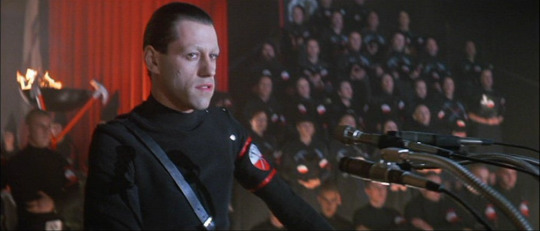
If you look at Japanese fascism, there is big fixation on aesthetic purity focus, with the only thing mattering being conflict

7) Capitalism tends to value the urban, the industrial, and the technology, while fascists, like the Confederates before them, are enamored with the rural and the pre-industrial. This might seem surprising, but there are a lot of fascists who are into environmentalism, Nazis Germany was one of the first states to pass laws banning animal cruelty and limiting smoking. Fascists are really into this sort of “Clean earth, clean people’ aesthetic which always serves as the breeding ground for cruelty.
8) Capitalism tends to be leery of state control and fascists are all about that shit
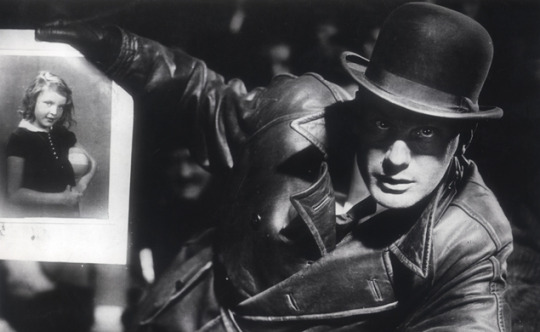
9)Finally….we need to be frank. A lot of the ways we talk about anti capitalism actually can fit really nicely into the antisemitic narratives that so dominated fascist thinking.
so the Marxist says
“Hey the entire world is controlled by a tiny elite of rich greedy parasites who are making us fight each other in order to benefit themselves”
And the Fascist says
“Yeah….they are Jewish”
its actually really hard to depict the rich as a class without accidentally wandering into anti Jewish sentiments, because the last 2,000 years of anti Jewish racism has been about creating conspiracy theories where they secretly control the entire world. A lot of what fascism does is taking existing issues of capitalism and being like “oh yeah…that is the fault of the Jews. Or migrants/African Americans/Muslims/feminists ect. Gamergate is a good example of this, they are pissed at corporations, but they blame feminists rather than you know…the inherently predatory nature of capitalism. Many of the things we don’t like about capitalism are things they also don’t like about capitalism. This is a major thing they do in terms of recruiting, they focus on getting people pissed at capitalism but then make it be secretly run by Jews rather than you know..Jeff Bezos.

(nazi properganda and below are soviet Images of capitalism )

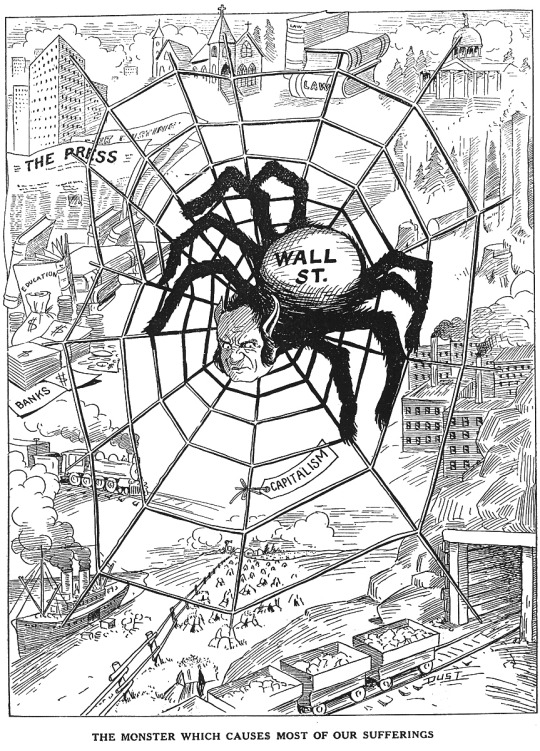
(and sometimes both)

This is why btw, I am less anti capitalist than most leftists, because talking to fascists makes you appreciate things about them. Hitler was destroyed by both a communist dictatorship and a capitalist democracy working together.
Its worth noting that while fascists do hate capitalism, they hate socialism a lot more, and tend to ally with capitalist to kill leftists, as we see from the Weimar Republic. Fascist are often ok with certain types of corporate authoritarianism, but in the same way the left can be ok with somebody like Obama.

(Frank Miller’s Batman is if Libertarian and Fascism had a baby)
The lesson I would take from this is that just because somebody hates the thing you hate, doesn’t mean they are necessarily your ally, they might in fact be even worse. Yet another reason to distrust the dirtbag left
#ask EvilElitest#Fascism#capitalism#adam Smith#Communism#Marxism#Nazism#Political theory#Liberalism#Imperial Japan#Nazi Germany#Fascist Italy#Alt Right#Gamergate#Dirtbag left
83 notes
·
View notes
Link
You know what America needs? More mirrors for princes—the Renaissance genre of advice books directed at statesmen. On the Right, we have many books that identify, and complain about, the problems of modernity and the challenges facing us. Some of those books do offer concrete solutions, but their audience is usually either the educated masses, who cannot themselves translate those solutions into policy, or policymakers who have no actual power, or refuse to use the power they do have. Scott Yenor’s bold new book is directed at those who have the will to actually rule. He lays out what has been done to the modern family, why, and what can and should be done about it, by those who have power, now or in the future. Let’s hope the target audience pays attention.
The Recovery of Family Life instructs future princes in two steps. First, Yenor dissects the venomous ideology of feminism, which seeks to abolish all natural distinctions between the sexes, as well as all social structures that organically arise from those distinctions. Second, he tells how the family regime of a healthy modern society should be structured. By absorbing both lessons and applying them in practice, the wise statesman can, Yenor hopes, accomplish the recovery of family life. (Yenor himself does not compare his book to a mirror for princes; he’s too modest for that. But that’s what it is.)
…
You will note that this is a spicy set of positions for an academic of today to hold. You will therefore not be surprised to learn that Yenor was the target of cancel culture before being a target was cool. He is a professor of political philosophy at Boise State University, and in 2016, in response to Yenor’s publication of two pieces containing, to normal people, anodyne factual statements about men and women, a mob of leftist students tried to defenestrate him. Yenor was “homophobic, transphobic, and misogynistic.” (We can ignore that the first two of those words are mostly content-free propaganda terms designed to blur discourse, though certainly to the extent they do have meaning, that meaning should be celebrated—I would have given Yenor a medal, if I had been in charge of Boise State.) They didn’t manage to get him fired (he has tenure and refused to bend), but the usual baying mob, led by Yenor’s supposed peers, put enormous pressure on him, which could not have been easy. He still teaches there; whether it is fun for him, I do not know, but it certainly hasn’t stopped him promulgating the truth.
…
Yenor begins by examining the intellectual origins of the rolling revolution, found most clearly within twentieth-century feminism. One service Yenor provides is to draw the battle lines clearly. He does this by swimming in the fetid swamps of feminism; I learned a lot I did not know, although none of it was pleasing. He spends a little time discussing so-called first-wave feminism, but much more on second-wave feminists, starting with Simone de Beauvoir, through Betty Friedan, and into Shulamith Firestone, this latter a literally insane harridan who starved herself to death. The common thread among these writers was their baseless claim that women had no inherent meaningful difference from men, and that women could only be happy by the abolition of any perceived difference. This was to lead to self-focused self-actualization resulting in total autonomy, and a woman would know she had achieved this, most often, by making working outside the home the focus of her existence. Friedan was the great popularizer of this destructive message, of course, which I recently attacked at length in my thoughts on her book The Feminine Mystique.
…
After this detailed examination of core feminist ideas, Yenor suffers more, slogging through the thought about autonomy of various two-bit modern con men, notably Ronald Dworkin and John Rawls. He analyzes the dishonest argumentative methods of all the Left, in general and in specific with regard to family topics—false claims mixed with false dichotomies and false comparisons, what he calls the “liberal wringer,” the mechanism by which any argument against the rolling revolution is dishonestly deconstructed and all engagement with it avoided. The lesson for princes, I think, is to not participate in such arguments, and to remember what our enemies long ago learned and put into practice—that power is all.
Yenor describes how the modern Left (which he somewhat confusingly calls “liberalism,” but Rawls and his ilk are not liberal in any meaningful sense of the term, rather they are Left) uses the law to achieve its goal of the “pure relationship,” meaning the aim that all relationships must be ones of free continuous choice, that is, without any supposed repression. This leads to various destructive results when it collides with reality, including the reality of parent-child bonds, and more generally is hugely destructive of social cohesion. From this also flow various deleterious consequences resulting from ending supposed sexual repression; this section is replete with analysis of writings from Michel Foucault to Aldous Huxley, and contains much complexity, but in short revolves around what was once a commonplace—true freedom is not release from constraints, but the freedom to choose rightly, to choose virtue and not to be a slave to passions, and rejection of this truth is the basis of many of our modern problems.
…
Finally, Yenor turns to what should be done, which is the most noteworthy part of the book. As he says, “Intellectuals who defend the family rightly spend much time exposing blind spots in the contemporary ideology. All this time spent in the defensive crouch, however, distracts them from thinking through where these limits [i.e., the limits Yenor has just outlined in detail] point in our particular time and place. Seeing the goodness in those limits, it is necessary also to reconstruct a public opinion and a public policy that appreciates those limits.” Thus, Yenor strives to show what a “better family policy” would be.
This is an admirable effort, but I fear it is caught on the horns of a dilemma. The rolling revolution does not permit any stopping or slowing; much less does it permit any retrenchment or reversal. Our enemies don’t care what we think a better family policy would be. And if we were to gain the power to implement a better family policy, by first smashing their power, there is no reason for it to be as modest as that Yenor outlines—rather, it should be radical, an utter unwinding of the nasty web they have woven, and the creation of a new thing. Not a restoration, precisely, but a new thing for our time, informed by the timeless Old Wisdom that Yenor extols. The defect in Yenor’s thought, or at least in his writing, is refusing to acknowledge it is only power that matters for the topics about which he cares most. But presumably the future princes at whom this book is aimed will know this in their bones.
Yenor himself doesn’t exactly exude optimism. Nor does he exude pessimism, but he begins by telling us that “we are still only in the infancy” of the rolling revolution. This seems wrong to me; in the modern age, time is compressed, and fifty years is plenty of time for the rolling revolution, a set of ideologies based on the denial of reality, to reach its inevitable senescence, when reality reasserts itself with vigor. This is particularly true since every new front opened by the revolution is more anti-reality, more destructive, and more revolting to normal people, who eventually will have had enough, and the sooner, if given the right leadership.
…
For most purposes, what Yenor advocates would be a restoration of family policy, both in law and society, as it existed in America in the mid-twentieth century. I’m not sure that’s going back far enough for ideas. You’re not supposed to say it out loud, and Yenor doesn’t, but it’s not at all clear to me that even first-wave feminism had any virtue at all. To the extent it is substantively discussed today, we are given a caricature, where the views of those opposed to Mary Wollstonecraft or John Stuart Mill are not told to us, rather distorted polemics of those authors about their opponents are presented as accurate depictions, which is unlikely, and even those depictions are never engaged with. But we know that most of what Mill said about politics in general was self-dealing lies that have proven to be enormously destructive, so the presumption should be that what he said about relations between men and women was equally risible.
…
Penultimately, Yenor addresses such new frontiers being sought by the rolling revolution, with the implication that the rolling revolution might, perhaps, be halted. Here he talks about the desire of the Left to have the state separate children from parents, particularly where and because the parents oppose the revolution, but more generally to break the parent-child bond as a threat to unlimited autonomy. He says, optimistically, “No respectable person has (yet) suggested that parents could be turned in for hate speech behind closed doors.” But this has already been proven false; Scotland is on the verge of passing a new blasphemy law, the “Hate Crime and Public Order Law,” and Scotland’s so-called Justice Minister (with the very Scots name of Humza Yousaf) has explicitly noted, and called for, entirely private conversations in the home that were “hate speech” to be prosecuted once the law is passed. A man like that is beyond secular redemption, yet he is also a mainline representative of the rolling revolution. The reality is that discussion does not, and will never work, with these people, only force. Still trying, Yenor presents a balanced picture to his hoped-for audience of princes, such as discussing when state interference in the family makes sense (as in cases of abuse). However, such situations have been adequately addressed in law for hundreds of years; the rolling revolution is not a new type of such balancing, but the Enemy. Discussions about it will not stop it. No general of the rolling revolution will even notice this book, except in that perhaps some myrmidons may be detached from the main host to punish Yenor, or to record his name for future punishment.
Yenor ends with a pithy set of responses to the tedious propagandistic aphorisms of the rolling revolution, such as “Feminism is the radical notion that women are human beings.” And, laying out a clear vision of a renewed society based on the principals he has earlier discussed, he tells us, “In the long term, the goal is to stigmatize the assumptions of the rolling revolution.” No doubt this is true; cauterizing the societal wound where the rolling revolution will have been amputated from our society will be, in part, accomplished by stigmatizing both the ideas and those who clamored for them or led their implementation. How to get to that desirable “long term,” though, when their long term is very clear, and very different from the long term Yenor hopes for? He says “Prudent statesmen must mix our dominant regime with doses of reality.” Yeah, no. Prudent statesmen, the new princes, must entirely overthrow our dominant regime, or not only will not a single one of Yenor’s desired outcomes see the light of day, far worse evils will be imposed on us. Oh, I’m sure Yenor knows this; it’s the necessary conclusion of Yenor’s own discussion of those eagerly desired future evils. He just can’t be as aggressive as me. I’m here to tell you that you should read this book, but amp up the aggression a good eight times—which shouldn’t be a problem, especially if you have children of your own, whose innocence and future these people want to steal.
1 note
·
View note
Text
Tonight I will be liveblogging the Argentine Presidential Debate (13/10/2019)! The tag will be #el biotipo mira el debate (I will also tag as #política if you want to blacklist)
We start at 21:00 PM Argentina time!
If you have followed the saga until now, the neoliberal Macri administration has plunged the country into a socioeconomicopolitical crisis in less than 4 years (that’s a new record for Argentina!) with massive inflation, debt, unemployment, recession, and a fucking devil’s deal with the IMF, AGAIN. His support that once reached half of Argentina has plumetted and in the latest election the Frente de Todos, the centre-left coalition with Alberto Fernández as presidential candidate and former president Cristina Fernandez de Kirchner as vicepresident have achieved an overwhelming victory on the primary elections, virtually making Alberto Fernández the next president. This massive loss of support to Macri (not that he had too much to begin with) has caused some even more chaotic weeks here as the president seems on his way out in the 27th October elections. While most of Argentina is divided between Macri and Alberto, some smaller parties are still competing. The idea is to either surpass the 45% of votes or have a 10% advantage over the next candidate to win in first round, or to make a good election to go to a FINAL DEATHMATCH second round ballotage between the two largest candidates (as in votes, not body weight)
As it stands today, Alberto and the Frente de Todos have a massive advantage and seem poised to win in the first round.
WILL THIS DEBATE DECIDE THE FUTURE OF ARGENTINA?
(spoilers: no)
Now let’s introduce the candidates!
In the interests of neutrality I will try to hide my zurdoperoncho leanings (VAMOS A VOLVER FF LOS DÍAS MÁS FELICES SIEMPRE FUERON PERONISTAS VAMOS ALBERTO VAMOS CRISTINA) and mock every candidate equally!
Alberto Fernández:

The Frente de Todos candidate and current favorite to be prime minister of her royal majesty Cristina Fernández (no relation) de Kirchner. He has sucessfully joined the warring tribes of Peronism and promises to fix the multiple problems of this country by building a time portal to 2003 when he was chief of cabinet and bringing the magic days of kirchnerism back. Has a nice dog, plays the guitar, and sometimes calls people wankers on twitter. His son cosplays Bakugou Katsuki (no, really).
Mauricio Macri:

Our current president, you might know him better as Gato, he is an engineer and businessman and good with numbers... which explains why our economy has entered its worst economic crisis since 2001. Has failed in literally everything he proposed. His new proposal to solve it is to dream really, really hard about a better country, with him as president of course, and sometimes scream: if that fails Pato Bullrich will send the gendarmes. His favorite words are “markets”, “the world”, and “bokita campeón”. Probably has a foot fetish.
Roberto Lavagna:

Found in an archeological excavation in Egypt in 1902, Lavagna was the economic minister under Néstor Kirchner. He basically promises to do pretty much the same as Alberto, but, you know, maybe take a nap first. I am not sure why he is still third in the election; probably uses magical mummy powers. Uses sandals with socks.
Nicolás del Caño:

Imagine, if you will, the most average left candidate possible, just a random trotskyst. Chances are you imagined Del Caño. He’s basically your average leftist candidate with average leftist proposals, legalizing abortion, weed, seizing the means of production and so on. It is unclear how he plans to accomplish that with 3% of the vote. Goes to the gym and has a catchy song about it. I hate that he sorta looks like me.
José Luis Espert:

A libertarian candidate, his solution to the massive crisis caused by reckless liberalization and cuts is to make more liberalization and cuts AND PRIVATIZE EVERYTHING. He is a pervert who has talked about his self-pleasuring habits regarding Cristina in twitter. His support base is mostly virgin gamers, taringueros, and people who read Ayn Rand. Was called a wanker by Alberto Fernández on twitter (no I wasn’t kidding)
Juan José Gómez Centurión:
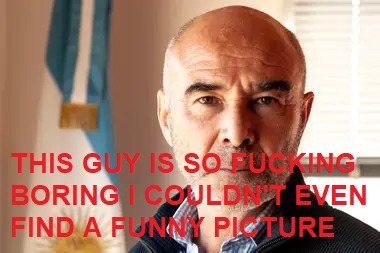
The far-right candidate, a former soldier. He opposses feminism, socialism, loves to be catholic, complains about poor people, etc. he’s a piece of crap but the worst thing is that he’s so fucking boring, I have little to say about him. Probably has anger issues? Whatever.
ANYWAYS, join me in half an hour for the presidential death fight!
89 notes
·
View notes
Text
“We’ve Lost”: A Commentary on Modern Conservatism
A lot of thinking has gone into this first blog post, and I keep coming back to the same phrase in my mind - “We’ve Lost”. Now before I jump into my thinking, I want to preface all of this.
This has (almost) nothing to do with the current “election” and its aftermath.
This is not meant to be hopeless. Even now as I think about the path this post is going to take, it’s hard to expect anyone to take in any other way, but just know that I am not without hope.
With that out of the way, what have we lost exactly?
The Public School System: Under our noses our Public Education System has been replaced by a Public Indoctrination System. Our schools have shifted from teaching how to think to teaching what to think. This has become crystal clear to me as we have labored under COVID fascism. I am blessed to have two daughters currently learning from home. My middle school daughter has spent the last three months of her English Language Arts class studying authors who have hated the United States and everything it stands for, mostly viewing the country through the lenses of race and poverty. These authors certainly have every right to their opinion, and there works are certainly worth reading and learning about, but would it hurt to highlight a author or two who appreciated the opportunity afforded by the United States? Could we balance that scale a little bit? And this is in English Class! Don’t get me started on their Social Studies class! I can sum that up in one experience: On the first day the teacher told her students that citizens in Communist China enjoyed more rights and freedoms than citizens of the USA. Enough said.
The Media: Here I am not only referring to the news media, although we have most certainly lost there. With the help of “Big Tech”, we have a media in this country that Joseph Stalin would be proud of. There is a Democratic Party narrative that is pushed and everything else is silenced.
The media is more than just the news. Take a look on any major streaming service and tell me, is there a new show or highlighted series that doesn’t push liberal social ideas? Conservative ideas are mocked and often portrayed as evil or in the best case, horribly misinformed.
Our Election System: I know. I said this article wasn’t in response to the current election, and then I write this. This is why I inserted the (almost). We have just witnessed the single biggest instance of election fraud in the history of voting. Even without digging into the numbers, you can see there was something wrong. There is a great piece at The American Thinker about this that I would encourage you to read. Link:
https://www.americanthinker.com/blog/2020/11/a_compilation_of_twenty_alleged_election_facts_that_dont_pass_the_smell_test.html
If this is the way elections are going to be handled, why even vote? And I’m sure that attitude is exactly what the people who perpetrated this fraud are counting on.
Higher Education: Our universities have become pulpits from which egotistical leftist professors can spout vile, anti-American rhetoric, often times to the captive audience of students who are dependent on them for their academic careers. The Washington Free Beacon keeps their eyes on this and puts out updates on radicalism on US campuses. Here is their latest:
https://freebeacon.com/campus/this-week-in-campus-insanity-vol-21/
So, there are four areas we have definitely lost. Granted, it is only four, but you have to admit that they are four pretty big ones, and I have not claimed that this is a complete or definitive list.
Now, saying that one has lost implies a few things. It implies that two sides were playing a game, one side lost, and that the game is over. I’m not sure that any or all of those assumptions are true.
First, I’m not sure that conservatives have been actually playing the game. In the words of my father, most conservatives just want to raise their families, get drunk on Saturday, and BE LEFT ALONE. The other side is much more engaged and relentless. I’m not exactly sure where that comes from, but it’s definitely there.
Second, the game is not over. In spite of what you hear on CBS, the election is not decided. Whichever way it goes, conservatives are likely to be extremely fired up by the result. Could this fraud be the spark that lights a fire under conservatism in the United States? Could this lead to our side engaging more and fighting back? Could the Democrat party be exchanging a short-term “win” here for huge defeats in 2022 and 2024?
Lots of questions, and unfortunately I have very few answers. What do you think?
1 note
·
View note
Text
How We Are All Going to Die Laughing
The other day, I was looking at a post made by one of my favorite internet comic artists. The guy used to be something I’d read in the army newspapers, next to the adds for cheap TVs at the post exchange, but these days it’s mostly a facebook feed I occasionally read. The artist and writer behind “PVT Murphy” (though these days Murphy’s a sergeant, I’m aging after all it seems) was annoyed at Facebook showing him a shopping page offering what amounted to white nationalist (US neonazi, if you prefer) paraphernalia.
Now, I pointed out that this was what the robot had concluded he wanted to see, and honestly none of us should be surprised by this. Military members lean right, and in the age of Trump this means that radicalization is around every corner- though for the record it always has been. In some insidious ways with a cancer of racists and bigots among our ranks, sure, I know because being gay I was targeted by a few myself, but also in more subtle ways.
I once watched a man scream at some Iraqis who were emptying a waste bin nearby, screaming that they didn’t get him, because he’d been the target of an IED attack two hours prior. Those men had no way in hell of having anything to do with it, but the guy that hit us got away free and the trash guys looked like someone he could defiantly vent his feelings of helplessness and victimhood upon in a vain effort to reclaim his power. I’m not condoning it, I’m just saying that sometimes the path to prejudice isn’t paved with propaganda and privilege.
I have every faith in the artist who draws PVT Murphy himself, but if you attract the attention of a lot of white supremacists, then probably the robot is going to conclude that you might want to look at some of the things that all the people who like your posts are looking at. Hence the shop page that offered a wall pinup of a templar knight preparing to smite the saracen to defend (white) Christendom with a few crass remarks about Islam written on it.
Now I explained, in truncated terms, how the robot made this call. The artist wasn’t excited about this explanation, and in fairness no one is excited about the black mirror showing them something ugly, it’s almost like an automated attack. But the machine was really just trying to be helpful. It wasn’t programmed to be sensitive to racial issues, and certainly the people who took out the add didn’t take that into their considerations. It identified a pattern and arranged the delivery of data that conformed with its instructions based upon the data input.
Now, some right wing dude decided to join in this discussion to point out that the robot didn’t know what it was talking about, included the terms “lib” and “snowflake” in his post, and suggested that if the robot had any idea who he was it wouldn’t keep showing him liberal content- after all he always used the laugh react on it. I pointed out this part as well, but I’d like to go into a deeper analysis for this discourse.
The right, and perhaps a lot of people using the reacts on facebook, has decided that you can use the laugh react to express a dismissive chuckle to the words of others. I think this has several sweeping, problematic implications.
First, the people using the internet are using it to each other, and are either unaware of the robots they share the internet with or ignorant regarding how they function. The robots do not interpret Laugh as a dismissive gesture. The data they gather from this is that you were paying attention to something and decided to put a reaction on it. The Laugh react is not a downvote on reddit, the robot, innocent little helperbot it was made to be, assumes you are amused by the thing you clicked on, and so endeavors to further tickle your funny bone. In short, it’s your good-natured wholesome friend who doesn’t understand the difference between you laughing with liberals and laughing at us. It thinks we’re all friends.
This leads to the second problem. If you are a conservative and you do not care to be bothered with leftist posts, then using the laugh react doesn’t help you at all. It further engages you with the content that annoys you. The stuff that caused you to try and put on your dismissive “ha ha tawdry communist drivel” mid-atlantic aristocrat voice is going to keep appearing. If you’re the sort given to conspiracy theories (and you are my bro, you still hate Hillary for the pizza thing), you might draw the conclusion that you are being targeted by leftist internet operatives, spamming your feed with leftist propaganda.
The truth is you’re spamming yourself with leftist content because your socially clueless helpful robot pal is gonna go out and find more things for you to laugh at. You’re not special or important enough for leftist internet operatives to target your facebook feed with propaganda attacks, and you have damned yourself to an experience on facebook in which you are bombarded with annoying or even blood-boiling content. All of this guidance, by the way, is equally applicable to left leaning users of the laugh react as a dismissive gesture.
What this does is contribute to people’s paranoia. It makes them believe that an enemy that doesn’t exist is trying to get into their heads. It fills their electronic lives with incendiary content that makes them angry and it encourages them further to continue to have generally unproductive electric arguments with people that they disagree with, leaving them exhausted by a brain full of cortisol.
Personally, I think the Left’s electric sin is more to do with our frankly superior witticisms (sorry Right, you invented and stuck to Nobama, you’re just not witty) and the craving so many of us seem to have for delivering that sick burn one-liner so cutting and succinct that it stops the conservative dead in his rhetorical tracks seems to consume online political discourse on the left almost as aggressively as call-out culture does when arguing among our own.
In the effort to sell us more things by pandering to our professed passions, the capitalist internet has created an electric rage engine that wraps you into one heated argument after another among people who are not listening to one another and who are learning to disengage from hard discussions. This last part is so dangerous to our democracy.
To be clear, I’m not lamenting the death of compromise specifically. There can be no compromise on the income gap, healthcre, free elections, or the rights of people who are darker in skin than I. But the electric rage engine makes it difficult to even have conversations about these things in the real world, and if you’re not talking to the people you disagree with face to face in the here and now, your chances of finding compromise are precisely zero percent, nevermind actually changing their views.
Have you noticed yourself having conversations with people that could just be copy pasted almost word for word off the tumblr where they “informed” themselves about this topic? I’ll bet that you have. Or else, more dangerously, you have begun to avoid having such conversations at all with people. Have you ever been in a discussion turned friendly debate with your friend and realized after a few moments that the debate isn’t suddenly so friendly? I’m willing to bet it’s been a while, so much so that you might even be shocked if it happens.
People like to go on about how fraught the holidays can be because of how politically charged family dinners can be, but I can’t remember such an experience within the past ten years. No throw down arguments, no discussions about the merits of one tax policy or another- we can’t even seem to discuss weighty matters with people who are blood kin anymore unless we already know they agree with our own views- and thanks to the electric rage engine, we can know, in precis, what their views are and what we think about them as a result long before we ever think about what to put in our covered dish. The opportunity for someone stepping into a landmine social or foreign policy issue at family and social gatherings has been eliminated, and with it the ability of the dinner table to serve as a place for families to reach consensus by resolving their arguments. We don’t talk politics with people who disagree with us in the real world anymore, we all just avoid it and spit our venom on the internet, achieving nothing but our mounting unhappiness and dislike for one another.
I have a young colleague at work, maybe 25, who demonstrated the ability to just promptly end a discussion last week. Now it was a nonsense discussion and in fairness the participants had gotten into trolling him for kicks, saying a blue shirt was green on purpose or some other nonsense, I don’t remember the particulars. But what I do remember vividly was the ease and efficiency with which he was able to simply end the discussion, how disengagement came so very naturally to him. I despise the phrase “agree to disagree” because it means that the argument hasn’t been resolved, but it is at least a sign that there was actual thought going on between participants. No such gesture here. My colleague put down the conversation and simply went back to his work with all the ease with which you might put down your phone when you decided you were done arguing with someone, and the ability to do this in realspace chilled me to the bone.
Moreover, there is a certain epistemological nihilism that has arisen among us, suggesting that no one can truly know anything because the sources of information, with whatever omissions or biases they may possess, are a matter of consumerist choice rather than objective fact. We can’t agree on what is real anymore because if you dislike someone’s account of events, you can simply get someone else to present a more palatable story and declare the other people liars.
If you don’t like what you read on NBC, you can simply tune to Fox to hear it told in a way that you choose to consume, often playing to your appetite for validation rather than your need for actionable information. We like feeling right, and the consumerist information economy has identified that as a means to get our attention long enough to upload some ads along with our news video of choice.
If the very identity of a person can be expressed by a computer algorithm and 4 or 5 hundred clicks across news articles, think pieces, and shopping pages, how easy will it be for the people who do understand how the machines work to begin influencing who we are?
In closing, I think every single one of us is developing a progressively more toxic relationship with the internet, particularly when it comes to political discourse, and I think that if we aren’t especially careful our ability to simply shut down and switch off, while healthy on the web, is going to begin invading our lives in the waking world in insidious ways that will hurt our ability to function as a cohesive society. I think that the marketing robots and the very act of making a profile and posting to it things that are important to you are dangerous influences on our sense of identity, and that by wrapping our sense of identity in the ideas and products that we consume in such a contrived, calculated fashion that we are restricting our ability to be flexible in our thinking, making us less able to get along with one another.
I’ve been on a soft departure from Facebook for a good while now, making it my loose rule to stick to messenger and instagram because I like indulging my vanity but for the most part I want to be interacting with people directly and not selling myself for likes when I use these things. Real attention from real people is much much better.
In 2020, I invite you to join me in kicking facebook or your own social media vice altogether and bringing our political lives and our debates back into the real world so that we can practice and re-acquire the skills of persuasion and discussion; not as a cynic call to begin trying to convert every conservative we can find, but for the sake of a political discourse that serves as less of a battleground with immovable ideological fortresses and more of a crucible in which the useless can be burned away and useful consensus and meaningful, mind changing-discussions can be had once again. We cannot afford to keep unsubscribing from one another if our democracy is to survive. (<- leftist witticism addiction in demonstration)
4 notes
·
View notes
Video
youtube
The important thing to note - that this video doesn’t quite outright say - is that Free Speech, as interpreted by self-appointed defenders of the US constitution, cannot exist without collapsing on itself. At a certain point, extremist hate-speech begins to police whatever free speech it disagrees with, regardless of political slant, to the point that speech is not free unless it’s innocuous (which means, not all speech, which means, not free speech).
Limitation must be placed on hate-speech. The concept of free speech cannot exempt anyone from consequences for what they say.
The video couches it in the conveniently closed venue of Twitter, whereas the issue is ubiquitous, and requires individuals to revalue the concept of free speech. Governments can regulate it, but so far, blanket “the right to free speech” is not great.
It’s rough ground to tread: The ideal is freedom of speech, wherein nobody says anything that constitutes hate-speech. The nadir is a definition of hate-speech that expands to include the regulation, suppression, or oppression of ideas not typically considered hate-speech by liberal minded people.
And, because I’m not burdened with a requirement to be bi-partisan, I can make the following two statements with much experience-based certainty, but little statistical backup: 1. Hate-speech as we see it now is the domain of the ignorant and the extremist right. There is demonstrable overlap. Typically there is overlap between ignorance and extremism in general. Left or right. Hate-speech is used by ignorant people. Ignorance is bi-partisan, though its expression typically isn’t. 2. Historically, and in most literature, as much as leftists may want to police the ideas of the extreme right (say, by referring to those ideas as hate-speech), it is extremist governments (typically run by dictators), who regulate speech such that it expands to outlawing other “normal” ideas and activities (see: they wouldn’t be extreme if they liked normal things).
So, when I say that the ideal of free speech is one that regulates hate-speech, I am also conscious of the fact that, in the political climate we currently exist in, an (arguably) extremist right US government is now regulating the ways in which sex workers can find, share, store, sell their work under the impression that they are protecting people from sex trafficking. It’s not coming from a manipulation of free speech, but it’s an unnecessary expansion of “sex trafficking is bad” to mean “sex work is bad because sex trafficking sometimes happens in it.” And, get this, I don’t really have a huge problem with some idiot saying that social program X perpetuates white genocide - in a vacuum. What I have a problem with is other idiots believing that idiot, taking that idiot seriously, and then using that idiot’s words to justify hate-crimes against the people who benefit from social program X. Nobody exists in a vacuum, though. You’d die. And yeah, it might be hate-speech for me to say “I really don’t have a problem with them saying that in a vacuum, because they would probably die, because it’s a vacuum.”
But, metaphorically speaking, nobody exists in a vacuum. There are and should be consequences for what you say and do. If the consequences of what you say or do are harmful to another person, you should not be allowed to say or do those things.
Usually, what you say and what you do are underpinned by what you believe, whether what you believe is true or not. But hey, you know what’s also a really unpleasant truth, highlighted by a different Vox video? Even when presented with facts that refute their beliefs, the majority of people will still retain the false belief, even though the overall number of people who had a false belief will go down. I digress.
If I say, “global warming is real”, that’s not hate speech. It’s my belief, based on evidence put before me by scientists who also believe it, based on evidence they have discovered. The causal line between me believing that global warming is true, and harm coming to other people is... not very direct. At best, if we acted in accordance with our belief that global warming is real by eliminating fossil fuels and pivoting to renewable energy, I can imagine that it would hurt the pocket books of some oil magnates, maybe? At super-best even. Let’s make it happen.
If I say, “white men are genetically superior to other races”, that’s a really stupid opinion based on not-facts. And if I believed it, you could expect that I would behave in such a way as to express the superiority I believed I had. There’s a pretty easy causal line to draw between that belief and harm to other people, even if all I’m doing is showing preferential treatment in hiring a white man over a black woman. My belief would be hurting another person.
I say, the distinction is the causal line. And we have to be careful about it, as mostly leftists in our tumblr echo-chamber. Ad hominem attacks (personal attacks) made in anger or frustration at some right-leaning/ignorant person who refuses to believe facts is not significantly different from them doing the same to you. There is no room for eye-for-an-eye morality in this.
And while I’m at it, we have to appreciate that the ideal is not the current reality. This is an truth that I wish we all understood here on tumblr. When you believe in an ideal so much, you will try to live by that belief and ideal. Of course. That’s natural. So, when you see someone who doesn’t conform to the ideal, the impulse is to think “how stupid are you that you don’t understand what I already believe to be true?!”
That’s your failing, not theirs, and as infuriating and futile as it may seem (especially when that futility is backed up by statistics), education is the only cure for ignorance. If ignorance really is the soil in which hate-speech grows, facts are the marginally effective herbicide, and saying “fuck them. they should educate themselves. I’m tired of hand holding.” is... well... pretty lame, if you don’t like hate speech and ignorance.
7 notes
·
View notes
Note
Okay, now I'm curious about what you saw of the Tea Party. (Not a new follower, if that matters?)
Hey, it’s fine! I’m mostly just trying to get some Content (TM) here, so... any questions are welcome. Caveat here: I was a teenager for the brunt of this, and I was a young teenager at the beginning of this. (I was only a sophomore in high school when it really kicked off and I started following it.) In my head, some things are mixed up- I did a little bit of fact-checking to make sure I got the dates right, and it turns out I didn’t at all. Also, I was never involved on the ground level, because I was a young teenager in a rural area and didn’t have the opportunity to do things like ‘go to protests’; most of my involvement was liking things on facebook.
WARNING: Long post is long, and I don’t want to put this under a cut in case I have to change my URL. If you don’t want to read this, you can press the ‘J’ key to skip down (or just... swipe, I guess. Sorry, mobile users.)
...So. Around the time President Obama got elected, a lot of conservative types were angry in the same way we are about Trump, and for nearly the same reasons (though, of course, they were wrong). They thought, thanks to right-wing media/propaganda, that Obama was an illegitimate president who was hiding all kinds of things from the American people and that he should never have gotten into office at all and that he was going to send the country to hell. And that was the people who weren’t flagrantly racist.
This was right after the 2008 financial crisis and no one was happy with how the government was handling the situation on either side of the political fence. Everyone wanted to see the banks punished for screwing people over, and under both Bush and Obama, that ... wasn’t what happened. The government in general let the banks off easy and gave them what they asked for so that the economy didn’t crash even harder. People were pissed off.
A number of grassroots protests happened. Most of them were not very successful, but the one that caught people’s attention was an anti-tax, anti-bank-bailout, anti-government-meddling-in-the-economy libertarian deal. It was technically ‘bipartisan’ - in that libertarians on both sides of the liberal/conservative divide were involved. I don’t remember too much about this one in specific- I was honestly more interested in the ‘juicy’ culture war stuff- but everyone on both sides of the fence talked about it for months.
The movement that sprung up around it was called the Tea Party-- after the Boston Tea Party, but TEA also stood for ‘Taxed Enough Already’. People started using Revolutionary-War imagery, hanging tea bags off their hats, that kind of thing. I think this is also when libertarians started using the Don’t Tread On Me flag, though that could have been just ‘I was a wee babby and this was the first time I was seeing it’.
...And at the time? I was really hopeful. It was really obvious that things were wrong, and anyone that had eyes to see could see it, even if we blamed different things for it. I thought this would be a thing that would get liberal and conservative people to come together to fight the Real Evil of taxes and bad government regulation. I thought that maybe it really would be bipartisan and people would do the ‘right’ thing and make a change in the world.
...of course, that isn’t what happened at all.
What happened was, conservative news media picked up on it and started touting it as an example of how much people hated Obama. People who hated Obama for other, much more dubious reasons glommed onto the Tea Party as a way of expressing their displeasure. Conservatives who hated Bush for ‘compassionate conservativism’ also glommed onto the Tea Party- they wanted the government to get out of the business of even pretending to help people. Then conservative media started going ‘see? see how p o p u l a r this Totally Bipartisan movement is? clearly everyone hates Obama as much as we do.’
A lot of Very Serious Moderate-Conservative people started freaking out about the Tea Party and trying to discredit them- as far as I remember, some of this may have been true. There were all kinds of rumours that the Koch brothers were funding them or that they were taking money from kooky right-wing candidates everyone hated or- in general, that there was some evil mastermind behind all this, that people weren’t rising up on their own because they were pissed off, that’s not a thing that HAPPENS, right? But happen it did.
So what happened was... a libertarian, vaguely-populist movement quickly spiralled out of control. Egged on by conservative media-- and by the general disdain they got from more ‘liberal’ media outlets-- it turned into a ‘I’m More Conservative Than Thou’ heckfest.
If the American right has learnt anything from the American left, it’s purity politics. This is when you started seeing the term RINO sprout up. RINO stands for ‘Republican In Name Only’ - in plain English, an actual conservative rather than a right-wing radical. The Tea Party popularized the term ‘RINO’ as meaning ‘anyone who doesn’t support the Tea Party or doesn’t support the increasingly radical direction it’s going’.
The Tea Party, at its various levels, started funding state and local elections- going against moderate Republican incumbents, and putting more right-wing candidates in their place. At the time, I thought this was great too- it was Putting Strong Good People who Believed All The Right Things In Places Where They Could Change The World.
...the thing was? The Tea Party is directly responsible for how crazy the Republican party is right now. And I’m horrified at even the little bit I did to cheer it on, but no one thought things would wind up like this. At least, not in 2008.
There’s a slang term in politics- ‘red meat’ - that means ‘the stuff your political base, your True Believers, rabidly care about that no one else really gives a damn about’. For instance, most people would not care about a proposal to tear down a statue of Columbus in the middle of town and replace it with.. IDK, a Little Free Library. For liberals/leftists, that might be a piece of red meat- replacing a statue of a genocidal maniac with a library? How wonderful! On the flip side, for conservatives, this might be a piece of red meat- how DARE you replace a statue of a NATIONAL HERO with some Weird Liberal Thing that will COST TAX MONEY!!!1!! But no one else really gives a damn, or has mixed opinions.
The Tea Party was all about giving conservatives red meat. And very little else, to be frank, because it was a populist movement. The conservative base had never really chosen candidates on how effective they’d be, they were always more focused on what their candidates believed than what they actually Did- but the Tea Party made them go nuts. They didn’t have to care about the candidates their party chose (based partly on how effective they’d be)? They could pick whoever they wanted? Well, that guy believes aliens built the pyramids, but he also says he’ll outlaw abortion and gay marriage, so why the hell not?
Tea Party candidates got crazier and crazier until you wound up with people like Sarah Palin seriously being considered for high office- candidates who would never wind up on the national stage before. Moderate Republicans were terrified. People thought the Tea Party was gonna become its own third party and be a real threat to the Republicans-- moderate ‘pubs either quietly became Democrats or started making the same kind of promises the Tea Party candidates were making.
I’m not sure if the Tea Party is still extant- I stopped hearing much about them in 2011, but that’s also the year that I stopped obsessively reading conservative news media, so they could still be around. As far as I know, the movement as a movement has basically quieted down. Maybe it was that people realized they looked silly wearing tricorne hats with tea bags hanging off them; maybe it’s that they were sick of getting called ‘teabaggers’; maybe it’s that the conservative media/mainstream media just stopped reporting on them once they stopped being new and shiny. Maybe they just switched to wearing MAGA hats.
...but the thing is, whether or not they won enough battles to stick around? They won the war.
Trump is the ultimate Tea Party candidate. He is all red meat and no vegetables or vitamins. He promises people the universe and then gives them a load of hot air for their trouble- and he puts on a great show. He gives them all the right words; all the best words. He hates taxes and government regulation-- he must, because he’s a successful businessman, right?
Ugh. That got depressing quick. Let’s just get to...
THE TAKEAWAY, for anyone who’s read this far.
The Tea Party is 99% of what radicalized the mainstream Republican party. I don’t think the alt-right would even be relevant if the Tea Party hadn’t paved the way for them. The Republicans started moving farther right by degrees long before the Tea Party, but the Tea Party accelerated the crazy- conservative pundits today say things that would be unthinkable even during the Bush administration.
Voting can and does have measurable effects; it’s just that voting for President and Congress once every four years does not. You have to be willing to vote for local and state candidates, to primary candidates you hate, to be picky about who you support, but also to vote for candidates within one of the major parties.
The Democratic Party does not give their base enough red meat. The Republican Party gives their base way too much red meat. This is why both parties are FUBAR- not giving your base enough red meat results in a shirty, disloyal, angry base that will betray you; giving your base too much red meat makes them stupid, petulant children.
As a voter- watch out for red meat. Try to think critically about what politicians are telling you and whether they’re playing on things that you care about to get your support. If a politician is promising you lots of things that you care about that most people have no reason to care about, are they trying to manipulate you? Odds are good the answer is ‘yes’.
#conservative malarkey#general malarkey#tea party#not the good kind unfortunately#politics#us politics#recent history#signed-me-again
85 notes
·
View notes
Text
What If Facebook Is the Real ‘Silent Majority’?
The Shift
Right-wing influencers are dominating the political discussion on Facebook, raising questions about whether it will translate into electoral success in November.

President Trump continues to have a lot of support among users on the social network.Credit…Doug Mills/The New York Times

Published Aug. 27, 2020Updated Nov. 4, 2020, 6:42 a.m. ET
Listen, liberals. If you don’t think Donald Trump can get re-elected in November, you need to spend more time on Facebook.
Since the 2016 election, I’ve been obsessively tracking how partisan political content is performing on Facebook, the world’s largest and arguably most influential media platform. Every morning, one of the first browser tabs I open is CrowdTangle — a handy Facebook-owned data tool that offers a bird’s-eye view of what’s popular on the platform. I check which politicians and pundits are going viral. I geek out on trending topics. I browse the previous day’s stories to see which got the most reactions, shares and comments.
Most days, the leader board looks roughly the same: conservative post after conservative post, with the occasional liberal interloper. (If you want to see these lists for yourselves, you can check out @FacebooksTop10, a Twitter account I created that shows the top 10 most-interacted-with link posts by U.S. Facebook pages every day.)
It’s no secret that, despite Mr. Trump’s claims of Silicon Valley censorship, Facebook has been a boon to him and his allies, and hyperpartisan Facebook pages are nothing new. (In fact, my colleague John Herrman wrote about them four years ago this month.)
But what sticks out, when you dig in to the data, is just how dominant the Facebook right truly is. Pro-Trump political influencers have spent years building a well-oiled media machine that swarms around every major news story, creating a torrent of viral commentary that reliably drowns out both the mainstream media and the liberal opposition.
The result is a kind of parallel media universe that left-of-center Facebook users may never encounter, but that has been stunningly effective in shaping its own version of reality. Inside the right-wing Facebook bubble, President Trump’s response to Covid-19 has been strong and effective, Joe Biden is barely capable of forming sentences, and Black Lives Matter is a dangerous group of violent looters.
Mr. Trump and his supporters are betting that, despite being behind Mr. Biden in the polls, a “silent majority” will carry him to re-election. Donald Trump Jr., the president’s oldest and most online son, made that argument himself at the Republican National Convention this week. And while I’m not a political analyst, I know enough about the modern media landscape to know that looking at people’s revealed preferences — what they actually read, watch, and click on when nobody’s looking — is often a better indicator of how they’ll act than interviewing them at diners, or listening to what they’re willing to say out loud to a pollster.
Maybe Mr. Trump’s “silent majority,” in other words, only seems silent because we’re not looking at their Facebook feeds.
“We live in two different countries right now,” said Eric Wilson, a Republican digital strategist and digital director of Marco Rubio’s 2016 campaign. Facebook’s media ecosystem, he said, is “a huge blind spot for people who are up to speed on what’s on the front page of The New York Times and what’s leading the hour on CNN.”
Image
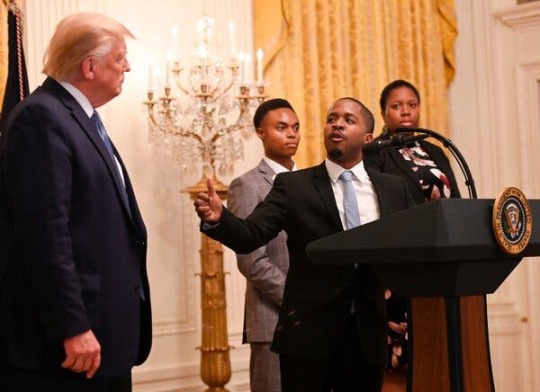
Mr. Trump with Terrence K. Williams, a conservative comedian, at the White House last year.Credit…Andrew Caballero-Reynolds/Agence France-Presse, via Getty Images
To be sure, Facebook is not the only medium where right-wing content thrives. Millions of Americans still get their news from cable news and talk radio, where conservative voices have dominated for years. Many pro-Trump Facebook influencers also have sizable presences on Twitter, YouTube and other social networks.
But the right’s dominance on Facebook, specifically, is something to behold. Here are just a few data points I pulled from CrowdTangle this week:
The conservative commentator Ben Shapiro has gotten 56 million total interactions on his Facebook page in the last 30 days. That’s more than the main pages of ABC News, NBC News, The New York Times, The Washington Post and NPR combined. (Data from a different firm, NewsWhip, showed that Mr. Shapiro’s news outlet, The Daily Wire, was the No. 1 publisher on Facebook in July.)
Facebook posts by Breitbart, the far-right news outlet, have been shared four million times in the past 30 days, roughly three times as many as posts from the official pages of every Democratic member of the U.S. Senate combined.
The most-shared Facebook post containing the term “Black Lives Matter” over the past six months is a June video by the right-wing commentators The Hodgetwins, which calls the racial justice movement a “damn lie.” The second most-shared Black Lives Matter post? A different viral video from The Hodgetwins, this one calling the movement a “leftist lie.” (The Hodgetwins also have the 4th, 6th, and 12th most shared posts.)
Terrence K. Williams, a conservative comedian and Trump supporter, has averaged 86,500 interactions per Facebook post in August, more than twice as many as Joe Biden, the Democratic presidential nominee, who has averaged 39,000 interactions per post. (Mr. Trump outdoes them both, naturally, with an average of 92,000 interactions per post.)
A few caveats, before my Democratic readers jump off the nearest pier.
These figures include only posts on public pages, in public groups, and by verified accounts, and they don’t include Facebook ads, where the Biden campaign has been outspending the Trump campaign in recent weeks. Counting Facebook interactions doesn’t tell you how someone felt about a post, so it’s possible some conservative posts are being hate-shared by liberals. And Facebook has argued that engagement isn’t the same thing as popularity.
“These points look mostly at how people engage with content, which should not be confused with how many people actually see it on Facebook,” Joe Osborne, a Facebook spokesman, said in a statement. Mr. Osborne added that “when you look at the content that gets the most reach across Facebook, it’s not at all as partisan as this reporting suggests.” (Facebook does not disclose this type of data publicly, except once in a while in response to my tweets.)
Democrats aren’t totally absent from Facebook’s upper echelon. Ridin’ With Biden, a pro-Biden page started in April by the founders of the liberal Facebook page Occupy Democrats, has quadrupled its following over the past three months, and routinely gets more engagement than Breitbart and other right-wing heavy-hitters. Individual posts by Bernie Sanders, Barack Obama and other prominent Democrats have broken through in recent weeks.
And political campaigners have pointed out, correctly, that being popular on the internet isn’t a guarantee of electoral success. (“Retweets don’t vote,” as an experienced Democratic operative once told me.) In addition, Facebook’s older, more conservative user base may not reflect what’s happening on platforms like Instagram and TikTok, which draw a younger crowd.
Still, the platform’s sheer scale makes it vital to understand. As of 2019, 70 percent of American adults used Facebook, and 43 percent of Americans got news on the platform, according to the Pew Research Center. (Those numbers may have increased because of the pandemic.) We know that the company’s product decisions can make or break political movements, move fringe ideas into the mainstream, or amplify partisan polarization. Registering four million voters before the November election, as Facebook has said it would do, could be a decisive force all on its own. (Typically, higher turnout benefits Democrats, but given what we know about the media diets of hyperactive Facebook users, who knows?)
The reason right-wing content performs so well on Facebook is no mystery. The platform is designed to amplify emotionally resonant posts, and conservative commentators are skilled at turning passionate grievances into powerful algorithm fodder. The company also appears willing to bend its rules for popular conservative influencers. Recent reports by BuzzFeed News and NBC News, based on leaked documents, found that Facebook executives had removed “strikes” from the accounts of several high-profile conservative pages that had shared viral misinformation in violation of the company’s rules.
Image
The Biden campaign has been outspending the Trump campaign on Facebook in recent weeks.Credit…Pete Marovich for The New York Times
Over the past few years, I’ve come to view my daily Facebook data-dive as a kind of early-warning system — a rough gauge of what’s grabbing America’s attention on any given day, and which stories and perspectives will likely break through in the days to come.
And looking at Facebook’s lopsided political media ecosystem might be a useful reality check for Democrats who think Mr. Biden will coast to victory in November.
After all, Mr. Trump’s surging popularity showed up online before it showed up in any polls in 2016. And even though much about Facebook, and American politics, has changed in the past four years, the basic laws of social media physics still apply. Controversy wins. Negative beats positive. All attention looks good to an algorithm.
Image
Brad Parscale led Mr. Trump’s digital efforts in 2016. Credit…Saul Loeb/Agence France-Presse — Getty Images
Brad Parscale — the digital director of Mr. Trump’s 2016 campaign — told “60 Minutes” that of everything Mr. Trump did that year, the thing that actually moved the needle was Facebook.
“Facebook was the method,” Mr. Parscale said. “It was the highway which his car drove on.”
That highway is still open. And right now, the fastest cars on it have MAGA bumper stickers.
Read More
https://www.covid19snews.com/2020/11/04/what-if-facebook-is-the-real-silent-majority/
0 notes